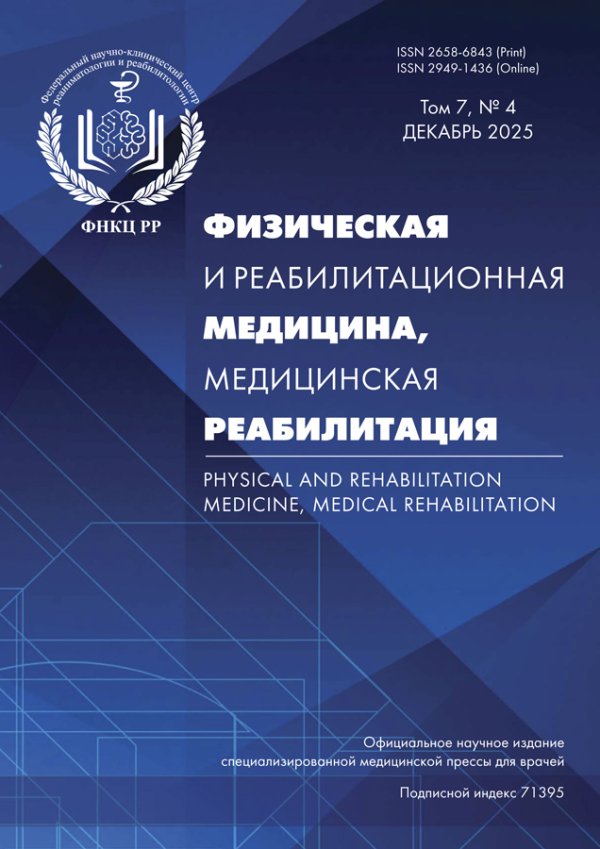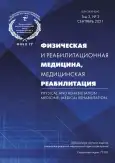Анализ структуры нарушений психоэмоциональной сферы у пациентов с последствиями острого нарушения мозгового кровообращения, проходивших реабилитацию в ФНКЦ РР, в условиях социально-коммуникативной депривации
- Авторы: Мартынова М.В.1, Петровская М.В.1, Штерн М.В.1, Куликов А.С.1, Милованова Е.В.1, Петрова М.В.2
-
Учреждения:
- ФГБНУ «Федеральный научно-клинический центр реаниматологии и реабилитологии»
- ФГАОУ ВО «Российский университет дружбы народов»
- Выпуск: Том 3, № 3 (2021)
- Страницы: 281-290
- Раздел: ОРИГИНАЛЬНОЕ ИССЛЕДОВАНИЕ
- URL: https://journal-vniispk.ru/2658-6843/article/view/80122
- DOI: https://doi.org/10.36425/rehab80122
- ID: 80122
Цитировать
Полный текст
Аннотация
Обоснование. В ФНКЦ РР проходят реабилитацию пациенты после мозговых катастроф — острого нарушения мозгового кровообращения, черепно-мозговых травм, операций на головном мозге. В период пандемии COVID-19 (2020–2021 гг.) положение пациентов, проходящих тяжелое испытание болезнью, осложняется ограничением на посещения в стационаре. Пациенты вынуждены находиться до месяца и более в одиночестве, вдали от семьи и близких, в условиях изоляции вследствие тяжелого заболевания.
Цель исследования — выявление среди пациентов частоты встречаемости, выраженности тревожных и депрессивных расстройств, вызванных длительным пребыванием в стационаре и ограниченным в связи с пандемией COVID-19 общением с родственниками.
Материал и методы. Группу исследования составили 132 пациента НИИ реабилитологии ФНКЦ РР, госпитализированные в период пандемии COVID-19 (с мая 2020 по апрель 2021 г.), группу сравнения — 104 пациента, проходившие лечение в отделениях НИИ реабилитологии ФНКЦ РР в 2019 г. После изучения медицинской документации сформированы 2 группы пациентов: группа исследования (n=21) и группа сравнения (n=24) с идентичным распределением по гендерному и возрастному признаку, тяжести неврологического дефицита (легкая и средняя степень тяжести поражения), локализации процесса, критериям социальной активности. В исследовании использованы следующие методы: организационные (сравнительный метод); эмпирические (наблюдение, беседа, анкетирование); психодиагностические (тесты ОДС-2, HADS, STAI); метод экспертных оценок; качественный метод обработки данных (дифференциация материала по группам, его анализ).
Результаты. Стресс от госпитализации и вынужденной изоляции резко ухудшает эмоциональное самочувствие, вызывает психическую дезадаптацию и часто проявляется развитием тревожно-депрессивной патопсихологической симптоматики: частота встречаемости личностной тревожности выросла в 3 раза; выраженность симптоматики ситуативной тревожности увеличилась в 1,5 раза; не выявлено ни одного случая невроза среди пациентов обеих групп.
Заключение. Для снижения негативных последствий психоэмоционального напряжения от вынужденной изоляции, предупреждения формирования социально-стрессового расстройства необходимо проводить ряд мероприятий не только в отдельном учреждении, но и на более широком уровне.
Полный текст
Открыть статью на сайте журналаОб авторах
Милена Вячеславовна Мартынова
ФГБНУ «Федеральный научно-клинический центр реаниматологии и реабилитологии»
Email: mmartinova@fnkcrr.ru
ORCID iD: 0000-0002-6757-5541
MD
Россия, 107031, Москва, ул. Петровка, д. 25, стр. 2Маргарита Владимировна Петровская
ФГБНУ «Федеральный научно-клинический центр реаниматологии и реабилитологии»
Email: mpetrovskaya@fnkcrr.ru
ORCID iD: 0000-0002-1517-8587
MD
Россия, 107031, Москва, ул. Петровка, д. 25, стр. 2Марина Викторовна Штерн
ФГБНУ «Федеральный научно-клинический центр реаниматологии и реабилитологии»
Автор, ответственный за переписку.
Email: mstern@fnkcrr.ru
к.м.н.
Россия, 107031, Москва, ул. Петровка, д. 25, стр. 2Александр Сергеевич Куликов
ФГБНУ «Федеральный научно-клинический центр реаниматологии и реабилитологии»
Email: fenikcnew@list.ru
MD
Россия, 107031, Москва, ул. Петровка, д. 25, стр. 2Елена Викторовна Милованова
ФГБНУ «Федеральный научно-клинический центр реаниматологии и реабилитологии»
Email: elenitamsk@yandex.ru
MD
Россия, 107031, Москва, ул. Петровка, д. 25, стр. 2Марина Владимировна Петрова
ФГАОУ ВО «Российский университет дружбы народов»
Email: mail@petrovamv.ru
ORCID iD: 0000-0003-4272-0957
д.м.н., доцент
Россия, МоскваСписок литературы
- Лебедев В.И. Групповая изоляция. Психические состояния / под ред. Л.В. Куликова. Санкт-Петербург: Питер, 2001. 512 с. [Lebedev VI. Group isolation. Mental states. Ed. by L.V. Kulikov. Saint Petersburg: Peter; 2001. 512 p. (In Russ).]
- Маслов И.А. Влияние фактора изоляции на психическое состояние. Проблемы сенсорной изоляции. Москва: Ин-т психологии АПН СССР, 1970. С. 38–43. [Maslov IA. The influence of the isolation factor on the mental state. Sensory isolation problems. Moscow: Institute of Psychology of the USSR Academy of Medical Sciences; 1970. Р. 38–43. (In Russ).]
- Чертовикова А.С. Психотравмирующие факторы в условиях изоляции // Проблемы современного педагогического образования. 2018. № 60. С. 485–489. [Chertovikova AS. Psychotraumatic factors in isolation. Problems of modern pedagogical education. 2018;(60): 485–489. (In Russ).]
- Лебедев В.И. Психология и психопатология одиночества и групповой изоляции. Москва: ЮНИТИ, 2002. С. 7. [Lebedev VI. Psychology and psychopathology of loneliness and group isolation. Moscow: UNITY; 2002. Р. 7. (In Russ).]
- Лебедев В.И. Личность в экстремальных условиях. Москва: Политиздат, 1989. С. 11. [Lebedev VI. Personality in extreme conditions. Moscow: Politizdat; 1989. Р. 11. (In Russ).]
- Хрящева Н.Ю. Особенности психических состояний в условиях изоляции. Психические состояния / под ред. Л.В. Куликова. Санкт-Петербург, 2001. 410 с. [Khryashcheva NY. Features of mental states in isolation. Mental states. Ed. by L.V. Kulikov. Saint Petersburg; 2001. 410 p. (In Russ).]
- Тхостов А.Ш., Рассказова Е.И. Психологическое содержание тревоги и профилактики в ситуации инфодемии: защита от коронавируса или «порочный круг» тревоги? // Консультативная психология и психотерапия. 2020. Т. 28, № 2. С. 70–89. [Tkhostov ASh, Rasskazova EI. Psychological content of anxiety and prevention in the situation of infodemia: protection from coronavirus or a "vicious circle" of anxiety? Counseling Psychology and Psychotherapy. 2020;28(2):70–89. (In Russ).] doi: 10.17759/cpp.2020280204
- Kennedy P. Rehabilitation psychology: Introduction, review, and background. Oxford Handbook of Rehabilitation Psychology. Oxford: Oxford University Press; 2012. P. 3–9.
- Гримак Л.П. Одиночество. Психические состояния / под ред. Л.В. Куликова. Санкт-Петербург: Питер, 2001. С. 402–403. [Grimak LP. Loneliness. Mental states. Ed. by L.V. Kulikov. Saint Petersburg: Piter; 2001. Р. 402–403. (In Russ).]
- Бойко О.М., Медведева Т.И., Ениколопов С.Н., и др. Психологическое состояние людей в период пандемии COVID-19 и мишени психологической работы // Психологические исследования. 2020. Т. 13, № 70. С. 1. [Boyko OM, Medvedeva TI, Enikolopov SN, et al. The psychological state of people during the COVID-19 pandemic and the targets of psychological work. Psychological Research. 2020;13(70):1. (In Russ).]
- Мецлер А.В. Социальная депривация как основной социальный дискурс вторичной социализации лиц с ментальными нарушениями в условиях стационарного учреждения // Социология. 2020. № 2. С. 153–159. [Metsler AV. Social deprivation as the main social discourse of secondary socialization of persons with mental disorders in a stationary institution. Sociology. 2020;(2):153–159. (In Russ).]
- Ермасов Е.В. Аутодеструктивный тип переживаний стресса в условиях изоляции // Развитие личности. 2020. № 3. С. 139–145. [Ermasov EV. Autodestructive type of stress experience in isolation. Personality Development. 2020;(3):139–145. (In Russ).]
Дополнительные файлы









